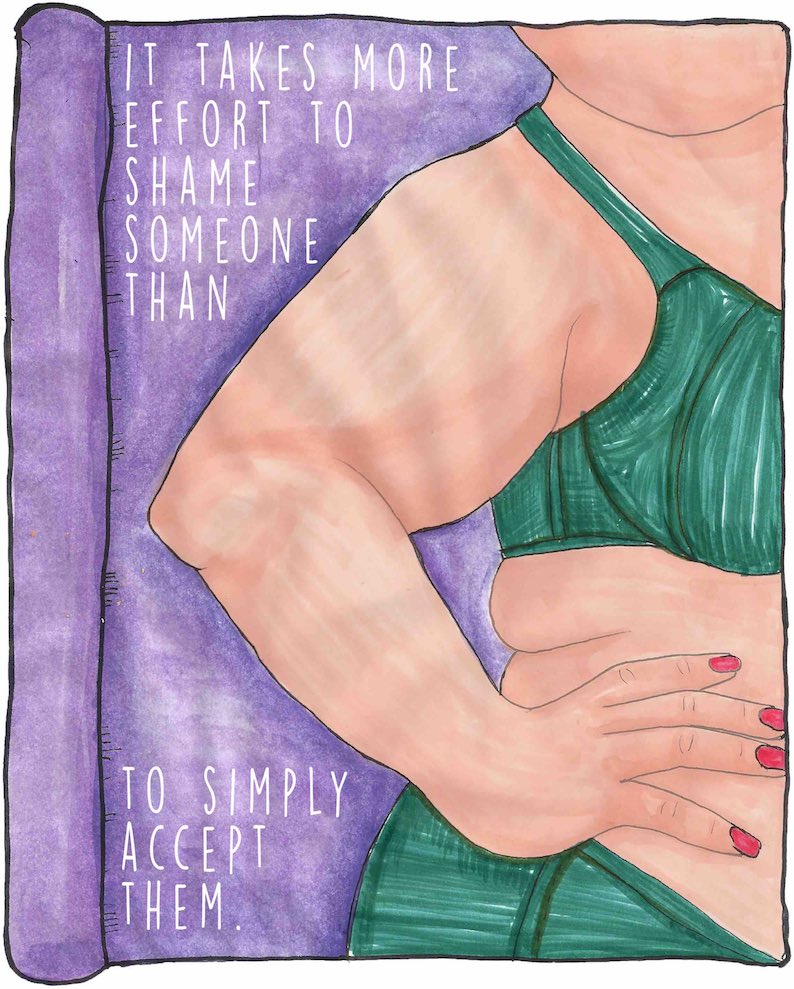If Marginalizing Fat People is the Answer, Reconsider the Question
There are some facts which are undeniable. The United States in particular and the world in general face populations that are increasingly overweight or obese. That’s not up for debate. There are serious health risks associated with being overweight or obese, like heart disease, type two diabetes, and high blood pressure. No one is denying this.
But there’s another undeniable fact that people decrying fat acceptance forget: shaming doesn’t help; in fact, it hurts.
Body shaming is terrible for many reasons but the biggest reason is that it simply doesn’t help people to lose weight. Multiple studies associated with the National Institute of Health and other prominent organizations show that when people feel stigmatized because of their weight they are more likely to gain more rather than lose any. It makes sense—people who have a bad self image may lack the motivation to make healthy changes. If the world sees you as a disgusting and unhealthy mess, it can make you feel awful. If you accept the world’s negative image of yourself, why even bother to change?
Another problem with fat shaming is assuming that being overweight is easily fixable. People who have never struggled with their weight sometimes say that heavy people should “just put down the cheeseburger” or “hit the gym.” As many studies show, weight loss is not as easy as it sounds. Recently, a study of contestants on the eighth season of The Biggest Loser showed that, after the show ended, most of the contestants gained back the weight they had lost. It turns out that their metabolism had been permanently affected, causing them to burn fewer calories than other people of their size. While not all people gain back weight they have lost, many people do, and get caught in a vicious cycle.
That’s assuming they can lose the weight to begin with. There are plenty of health conditions that make it hard to lose weight, like polycystic ovary syndrome, which is estimated to affect one in 10 to 15 women. Mental health issues, like stress and depression, can also lead to weight gain. To assume that someone is overweight strictly because of things they can control is neither true nor fair.
This leads to another problem with those who reject the body acceptance movement—they assume that by looking at someone they can determine how healthy they are. That is patently false. Not everyone who is overweight is unhealthy and not everyone who is at a “normal” weight is healthy. While there are health risks associated with extra weight, not everyone who is heavy has health problems. Additionally, you can’t tell by looking at a person if they are doing something about their health. You may look at someone and shame them for being obese, all the while not knowing that that person has already made healthy changes and lost 50 pounds from their original weight. If you’re judging someone by their current appearance, you’re missing the whole picture.
I know this not just because I’ve read up on the studies, but because I, too, have had issues with my weight. A couple of years ago, I was overweight—borderline obese—and decided to make a change. I did not do it because I was unhealthy—I had a checkup and my bloodwork done before I started and everything came back perfectly normal— but because I wanted to wear cuter clothes and I didn’t want my family history of diabetes to catch up with me. It wasn’t always an easy or simple process but it was made easier due to my overall good health. Now I’m at a weight that’s considered healthy and normal and I’m pretty happy about how I look. I wish I had gone through the process earlier.
So why hadn’t I?
It’s simple. I had to be in a place where I loved my body and cared about it enough to want to make changes in my lifestyle. That took way longer than the time it took me to lose the weight itself. When I heard people putting down my weight or that of people whose bodies looked like mine, I didn’t feel like losing weight—I felt like a disgusting whale. Why not, then, finish off the bag of Reese’s Pieces? I felt like I couldn’t look much worse anyway. When I accepted my body as it was, mine, imperfect, not the media’s representation of beautiful but still worthwhile, even if it was fat, then I was able to make the changes. I finally felt I was worth the effort.
And that’s the sad thing—it takes more effort to shame someone for being fat than to simply accept them. Accepting them doesn’t mean praising them, or supporting them; it’s simply accepting that they exist. So no, fat acceptance isn’t the problem. Fat shaming is.







